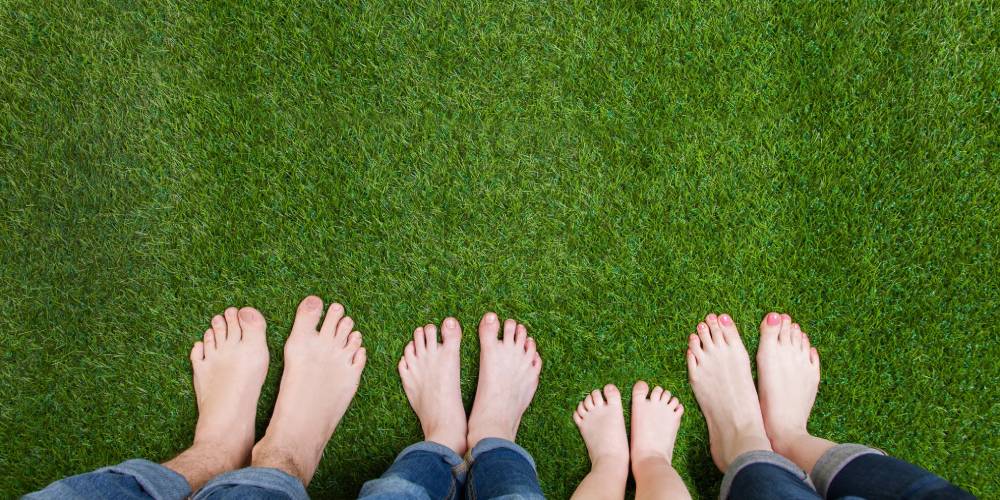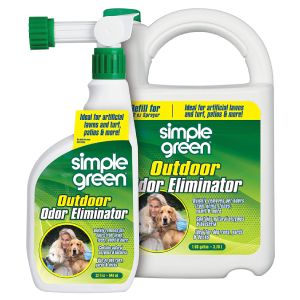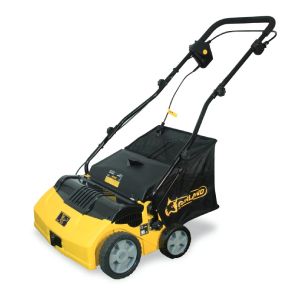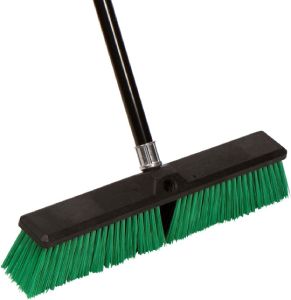- Duralawn
- Artificial Grass Maintenance
- Artificial Grass Cleaner
Artificial Grass Cleaner
A good artificial grass cleaner is something every synthetic lawn owner should consider purchasing or at least be aware of the benefits. It's inevitable that your grass will need to be cleaned especially if you have dogs or pets that urinate or deposit solid waste on the grass. Artificial turf lawns are growing in popularity partly because of their ultra low maintenance but there are a few things you may need do to keep it clean and sanitary throughout the year especially if you have children and pets.

The best way to eliminate harmful organisms or bacteria taking hold in your grass is to remove solid waste as soon as possible, and rinsing the grass with a garden hose to remove urine. This is especially important if you have dogs or pets that frequently use the lawn. In addition to a routine rinsing there are other options for keeping the grass clean and deodorized including detergents, vinegar or a strong enzyme cleaner designed specifically to kill potentially harmful bacteria, which we will discuss more about how to clean artificial grass below.
Pet Safe Artificial Grass Cleaner
There are many pet safe artificial grass cleaners for dogs on the market today. While this is great because it gives consumers several choices it can be confusing picking a cleaner that is strong enough to eliminate urine odours while being safe for anyone using the grass including children and dogs. There are specific artificial grass cleaners for dogs with strong enzymes that target bacteria found in urine and poop. The enzymes are heavy duty enough to kill bacteria and gentle enough to use in areas that children and dogs frequent and they won't damage your grass.
Dog friendly artificial grass cleaners are available in two main forms. There's a very convenient spray bottle with a premixed liquid usually with a ration of 1:10, enzyme cleaner concentrate to water. A quality product worth considering is an artificial grass spray cleaner that's ideal for spot cleaning and small areas that dogs or pets use as a bathroom. They are ideal for cleaning and breaking down organic substances such as stool, urine, blood, sweat and vomit. The billions of naturally occurring bioenzymes will eliminate odors at the source and degrade organic waste.
An alternative form of artificial grass cleaner is a heavy duty cleaning concentrate. An artificial grass cleaning concentrate is ideal for cleaning large areas frequently used by dogs. Kennels, dog runs or yards with multiple dogs will find using a concentrate beneficial and cost effective versus using a premixed spray cleaner. A concentrate is best applied by using a hose end sprayer with a dial that allows for multiple mixture ratio settings.
Simple Green Outdoor Odour Eliminator for PetsQuickly removes odours caused by urine, stool, vomit and organic matter. If you click on this link and make a purchase, we may earn a commission. |
How to Clean Artificial Grass Step by Step
Using a powerful artificial grass odour eliminator works by killing the bacteria that causes the pungent smell. Odours can develop from urine that collects in the artificial grass infill over time or stool particles left behind after picking it up. A quality cleaner that contains active enzymes is ideal for killing bacteria and the odour that often accompanies it, making it perfect for cleaning lawns and even artificial grass dog potties. Let's take a look at the basic steps for cleaning artificial grass urine smell and other types of organic matter.
1) Remove Large Debris
Removing debris from your artificial lawn is important because it will prevent organic matter from settling in between the grass blades. As material settles it can cause problems such as weed growth, moss and fungus that harbour odour causing bacteria. Debris can be removed easily with a blower or refreshed with a power broom for a deeper clean that will pull debris up from the grass backing.
It's best to start in one corner of the area and work your way towards the opposite corner. If you are power brushing, work in the opposite direction of the blade slant. The process of blooming up the blades is an important part of regular artificial grass maintenance. The goal is to remove as much organic debris as you can while fluffing up the grass, which leaves it in a state that will allow for optimal cleaning.
If you have pets and specifically dogs that use the grass area as a bathroom be sure to remove all stools. Any solid waste that isn't removed before rinsing can end up getting lodged into the grass thatch layer and can cause problems.
Garland Roll & Comb 502E Artificial Grass Power BrushClean and collect debris from artificial grass including; leaves, pine needles and pet hair. If you click on this link and make a purchase, we may earn a commission. |
2) Rinse with Garden Hose
A good rinse with a garden hose is an important step when preparing to use an artificial grass cleaner. Pay attention to areas that are frequented by pets or have a tendency to become soiled such as next to a sandbox or garden. The idea is to target dirt, any buildup of urine or other organic matter that can lead to other issues. Try to spray every square foot of the grass even where it doesn't appear to be dirty, as urine may be present even when not visible.
A pressure washer can be used instead of a garden hose but take care not to displace the infill material when doing so. It's very easy to overspray, disrupt infill material and even damage the grass.
3) Check for Weeds, Moss and Mould
After you have brushed and rinsed your grass it's the perfect time to inspect and see if any weeds, moss or fungus have taken hold. While a proper artificial grass installation will prevent most organic vegetation like weeds from growing, it's possible they may develop over time. If you find weeds, moss or fungus make a note of the location and apply a little extra artificial grass cleaner to ensure you address the problem.
4) Inspect for Stains or Residue
Inspect for stains or anything other foreign substance that shouldn't be on the grass. This can be in the form or paint, oil, tree sap, and even food left behind by a child or dog. While each of these substances will require a different approach, the goal is to get rid of the bulk of the product by whichever means and then removing the residue. This can be achieved with a stiff bristle push broom and baking soda, dry ice and even white vinegar, which we will discuss more below.
Food and drink spills can be cleaned with a natural, mild, eco-friendly cleaner and for best results, clean it as soon as possible after the spill. Rinse the area afterwards to remove the cleaner residue and don't use chemicals that can corrode or cause discolouring. Tree sap, candy and sticky gum is difficult to remove from artificial grass but it is possible with a bit of elbow grease. A good method is to freeze the substance with dry ice or an aerosol refrigerant and then break it away carefully.
Motor oils, grease, paints and other stubborn substances can be successfully cleaned with mineral spirits or a mild detergent solution mixed with warm water.
Tidy Tools Large 18" Push Broom with Alloy HandleStiff bristle push broom ideal for cleaning artificial grass. If you click on this link and make a purchase, we may earn a commission. |
5) Enzyme Cleaner Application
After you have addressed stubborn spots stains, if any, it's time to give the entire grass a thorough clean with an artificial grass enzyme cleaner. The easiest way to cover a lot of area in the least amount of time is to use a hose end sprayer with a ratio dial for setting the desired concentration. The enzyme cleaner concentrate should be applied evenly to the entire yard but you can go over areas of high urine or stool to ensure adequate cleaning agent is applied.
This is the final step to cleaning artificial grass and should take 15-20 minutes for every 1,000 square feet or grass. The cleaner should have recommendations for dilution and the area that should be covered for the size of the hose end sprayer container. As you learn the tendencies of your dogs, time of year, and other variables you will have a good understanding of how much enzyme cleaner is required to quell urine odours and disinfect.
Cleaning Artificial Grass with Vinegar
Cleaning artificial grass with vinegar and water is a great way to kill and prevent bacteria. Although bacteria is very rarely found in properly installed and maintained synthetic lawns, it is possible to find bacteria in areas such as dog runs, kennels and areas where food is prepared or served. If grass is installed with an adequate sub layer that allows proper drainage combined with an anti-microbial infill it makes it nearly impossible for bacteria to grow.
The most common method of cleaning with vinegar is to mix equal parts of vinegar and water at a ratio of 1:1. A small area can be cleaned with a sponge and cloth while a big area it's best to use a spray bottle. Scrub the area as necessary and then rinse with clean water from a garden hose to rinse both the vinegar and urine, food, etc. through the grass. If you are cleaning a large backyard area we recommend using a hose end sprayer with attached mixing bottle.
45% Pure Vinegar Concentrate Grade 1GallonBiodegradable concentrated cleaning vinegar for artificial grass. If you click on this link and make a purchase, we may earn a commission. |
Artificial Grass Cleaner FAQs
If there are specific questions about artificial grass cleaners that you have, be sure to ask one of our experts. There are numerous cleaning products on the market today and it often will come down to choosing one that you trust or is available in your area. While it's unlikely you will ever have a problem with bacteria it can become an issue if dogs urinate frequently in a specific area, drainage isn't adequate or an anti-microbial infill wasn't used. When installing artificial grass for dogs these are things that should be considered.
Can you clean artificial grass?
Can you clean artificial grass?
Yes you can clean artificial grass. A basic clean can be done by rinsing with clean water from a garden hose. If a deeper clean is needed we recommend using an enzyme cleaner designed for artificial grass that will eliminate bacteria and odours and even have a pleasant scent.
How do you deodorize artificial turf?
How do you deodorize artificial turf?
Deodorizing and getting rid of urine smell from artificial grass can be challenging especially if there isn't proper drainage and an anti-microbial infill wasn't used. While dealing with drainage after grass is installed is likely not an option, you can deal with the smell in a couple of ways or a combination thereof. The first is to add an infill that prevents bacteria growth and secondly you can attack the bacteria that cause the smell with a strong enzyme cleaner. The best enzyme cleaners will kill the bacteria and even have a scent such as lemon or lavender.
We also recommend giving the grass and infill a deep clean at least once a year with a power brush to remove organic material that is likely causing the odours. The power brush and cleaner combination are two of the best artificial grass maintenance equipment tools especially if you own pets that use the grass area to pee and poop on.
What is the best pet odour eliminator?
What is the best pet odour eliminator?
The best pet odour eliminator will have an active bacteria fighting enzyme that will break down the ammonia and proteins that cause bad odours. They are non-toxic, eco-friendly, all natural, both kid and pet safe while being commercial grade strength. These cleaners are strong enough to be considered a professional artificial grass cleaner and are used successfully to clean kennels, dog runs and dog daycares.
Disclaimer
Please use all appropriate and proper safety precautions when attempting projects on this website. All projects are attempted at the reader's own risk.
Duralawn® participates in the Amazon Services LLC Associates Program, as an Amazon Associate we may earn a commission from qualifying purchases.
Duralawn® artificial grass installations, products and service in Kelowna, Vernon, Penticton, etc since 2018.




